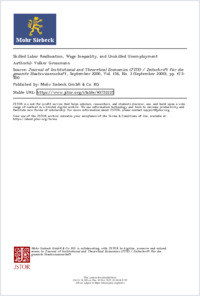Skilled Labor Reallocation, Wage Inequality, and Unskilled Unemployment
BP2-STS
- Grossmann, Volker ORCID University of Zurich
- 2000
Published in:
- Journal of Institutional and Theoretical Economics. - Mohr Siebeck GmbH & Co. KG. - 2000, vol. 6, p. 473-500
English
This paper analyzes the labor market effects of an increase in incentives in raising total factor productivity and, thus, reallocating high-skilled labor from production to non-production (i.e., R&D) activities. Within an endogenous growth framework, it is shown that such a reallocation of skilled labor depresses the demand for low-skilled labor. Contrary to the standard view of skill-biased technological change, the relative marginal productivity of labor changes only because of relative employment effects. Moreover, the impact of social comparisons between high-skilled and low-skilled workers and within the group of low-skilled worker are examied.
- Faculty
- Faculté des sciences économiques et sociales et du management
- Department
- Département d'économie politique
- Language
-
- English
- Classification
- Economics
- License
- License undefined
- Open access status
- green
- Persistent URL
- https://folia.unifr.ch/unifr/documents/323683
Statistics
Document views: 24
File downloads:
- 40752225.pdf: 134
